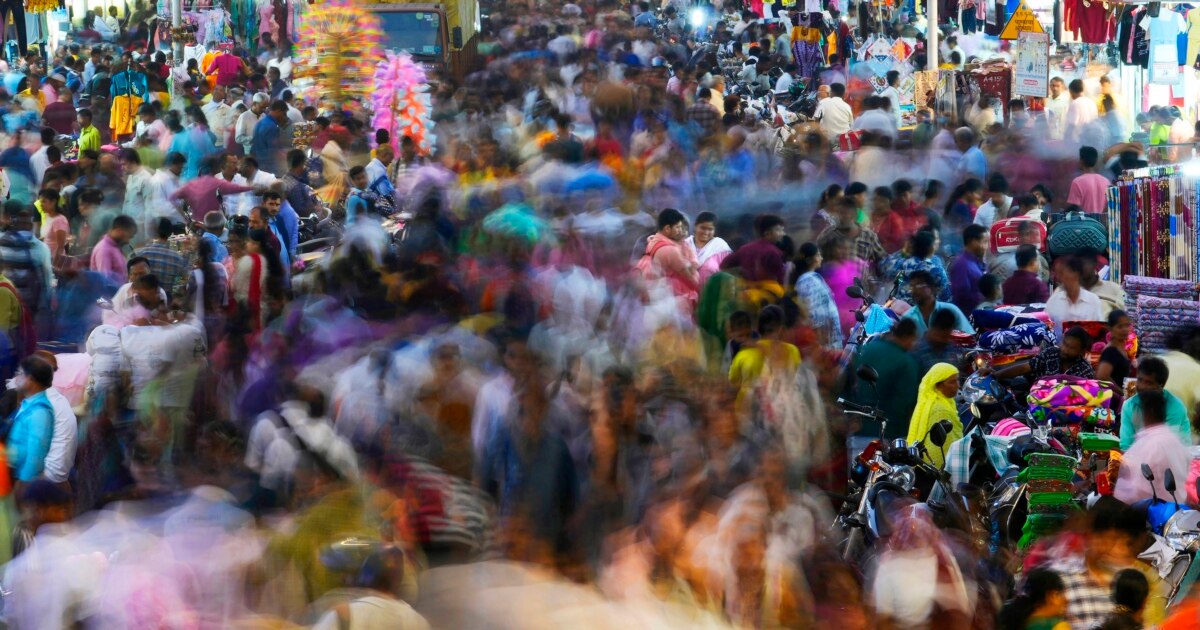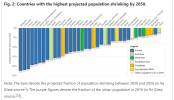- Učlanjen(a)
- 22.07.2016
- Poruka
- 11.465
Inače, na wikipediji može pisati tko god hoće i što god hoće.
Ali su navedeni ovi radovi:
- "Global food crisis looms as climate change and population growth strip fertile land Архивирано 2016-04-29 на сајту Wayback Machine". Guardian.co.uk (2007-08-31).
- „U.S. and World Population Clock”. Приступљено 5. 3. 2016.
- „Population seven billion: UN sets out challenges”. BBC. 26. 10. 2011. Приступљено 27. 10. 2011.
- Ehrlich, Paul R. Ehrlich & Anne H. (1990). The population explosion. London: Hutchinson. стр. 39—40. ISBN 978-0091745516. Приступљено 20. 7. 2014. „When is an area overpopulated? When its population cannot be maintained without rapidly depleting nonrenewable resources [39] (or converting renewable resources into nonrenewable ones) and without decreasing the capacity of the environment to support the population. In short, if the long-term carrying capacity of an area is clearly being degraded by its current human occupants, that area is overpopulated.”
- Ehrlich, Paul R; Ehrlich, Anne H (2004), One with Nineveh: Politics, Consumption, and the Human Future, Island Press/Shearwater Books, стр. 76—180, 256
- Ehrlich, Paul R; Ehrlich, Anne H (1991), Healing the Planet: Strategies for Resolving the Environmental Crisis, Addison-Wesley Books, стр. 6—8, 12, 75, 96, 241
- „Coping with the Anthropocene”. Phys.org. 17. 3. 2015. Приступљено 23. 1. 2017.
- Vaughan, Adam (7. 1. 2016). „Human impact has pushed Earth into the Anthropocene, scientists say”. The Guardian. Приступљено 23. 1. 2017.
- Dimick, Dennis (21. 9. 2014). „As World's Population Booms, Will Its Resources Be Enough for Us?”. National Geographic. Приступљено 23. 1. 2017.
- „World Population Clock: 7.7 Billion People (2019) - Worldometers”. www.worldometers.info (на језику: енглески). Приступљено 28. 6. 2019.
- Coleman, Jasmine (31. 10. 2011). „World's 'seven billionth baby' is born”. The Guardian. London. Приступљено 31. 10. 2011.
- „7 billion people is a 'serious challenge'”.
- „World Population Clock – Worldometers”. Worldometers.info. Приступљено 1. 8. 2010.
- „International Data Base (IDB) – World Population”. Census.gov. 28. 6. 2010. Архивирано из оригинала 7. 7. 2010. г. Приступљено 1. 8. 2010.
- „World Population Prospects:The 2008 Revision” (PDF). Population Division of the Department of Economic and Social Affairs of the United Nations Secretariat. jun 2009.
- „World population projected to reach 9.8 billion in 2050, and 11.2 billion in 2100”. Population Division of the Department of Economic and Social Affairs of the United Nations Secretariat. jun 2017.
- Rosling, Hans (2018). Factfulness: Ten Reasons We're Wrong About the World – and Why Things Are Better Than You Think. Sceptre. ISBN 9781473637467.
- „The end of high fertility is near” (PDF). population.un.org. Приступљено 9. 12. 2018.
- „World Population Prospects” (PDF). population.un.org. Приступљено 9. 12. 2018.
- „joint statement by fifty-eight of the world's scientific academies”. Архивирано из оригинала 10. 2. 2010. г.
- Wright, Oliver. „Britain's food self-sufficiency at risk from reliance on overseas imports of fruit and vegetables that could be produced at home”. independent.co.uk. Приступљено 11. 7. 2014.
- Michael E. Arth, Democracy and the Common Wealth: Breaking the Stranglehold of the Special Interests, (2010), Chapter 35: "Overpopulation"
- Eileen Crist and Philip Cafaro (eds). Life on the Brink: Environmentalists Confront Overpopulation. University of Georgia Press, 2012. ISBN 978-0820343853
- Ehrlich, Paul R.; Ehrlich, Anne H. (9. 1. 2013). „Can a collapse of global civilization be avoided?”. Proceedings of the Royal Society B. 280 (1754): 20122845. PMC 3574335
. PMID 23303549. doi:10.1098/rspb.2012.2845. Comment by Prof. Michael Kelly, disagreeing with the paper by Ehrlich and Ehrlich; and response by the authors

- Stephen Emmott, Ten Billion (2013)
- Suzanne Goldenberg (24 September 2015). Pope's climate push is 'raving nonsense' without population control, says top US scientist, The Guardian
- Fred Guter, The Fate of the Species: Why the Human Race May Cause Its Own Extinction and How We Can Stop It (2012)
- Rob Hengeveld, Wasted World: How Our Consumption Challenges the Planet (2012). Focuses on the interrelationships and interactions between human overpopulation and most of the key challenges facing global society, and the pressures that overpopulation and resource consumption place on the natural environment
- J.R. McNeill, Peter Engelke, The Great Acceleration: An Environmental History of the Anthropocene since 1945 (2016)
- Motesharrei, Safa; Rivas, Jorge; Kalnay, Eugenia (2014). „Human and nature dynamics (HANDY): Modeling inequality and use of resources in the collapse or sustainability of societies”. Ecological Economics. 101: 90—102. doi:10.1016/j.ecolecon.2014.02.014.
- Thomas Robertson, The Malthusian Moment: Global Population Growth and the Birth of American Environmentalism (2012), Rutgers University Press
- Karen Shragg, Move Upstream: A Call to Solve Overpopulation. ISBN 978-0988493834 (published November 2015). Discussion of the book by the author, March 2017 (video, 91 minutes).
- Alan Weisman. Countdown: Our Last, Best Hope for a Future on Earth? Little, Brown and Company, (2013) ISBN 0316097756
- Ozzie Zehner, The Environmental Politics of Population and Overpopulation. University of California, Berkeley.
- "Overdevelopment, Overpopulation, Overshoot" (2014), a free book of photos of the social and ecological impact of human overpopulation. The Population Institute, Washington, DC
Hoćeš reći da svi ovi radovi nemaju pojma. Hajde samo ih nabroj za početak.
Baš ideš protiv razuma.



